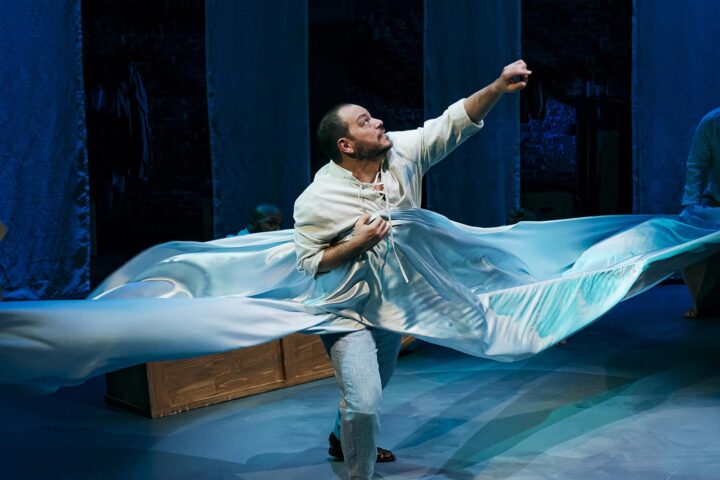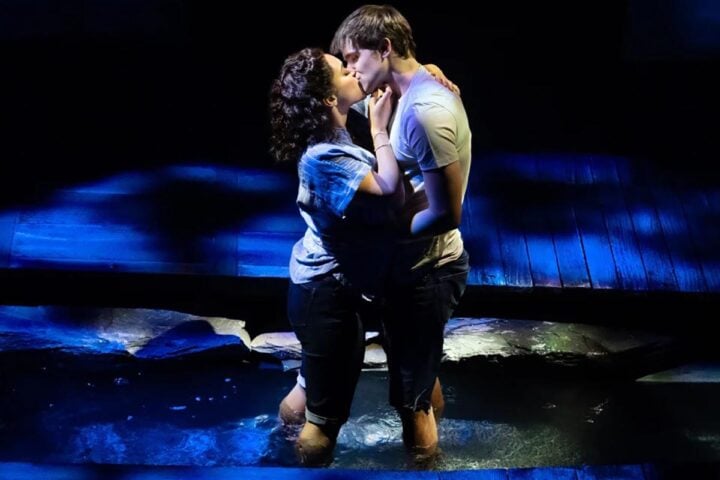It’s not hard to imagine what Justin Peck heard in Sufjan Stevens’s 2005 album Illinois that convinced him that the music pulsated with possibilities for dance. Illinois, with its orchestral textures, surprising mixed-meter rhythms, and impressionistic instrumental interludes, is an explosively varied 75 minutes of music as Stevens’s lyrics traverse the history, geography, and iconography of the Prairie State. At its best, Peck’s stage adaptation, which arrives at the Park Avenue Armory following a run at the Chicago Shakespeare Theater, suggests that rapturous movement was somewhere inside Stevens’s songwriting from the start.
In Illinoise (the show’s title follows the stylized spelling on the album’s cover), a 14-piece band including three featured vocalists, pay thoughtful homage to Stevens’s original arrangements. Since Stevens played over 20 instruments on Illinois, watching the full band, led by Nathan Koci, can feel like the songwriter’s solo artistry has fragmented expansively across the stage in Timo Andres’s expressive orchestrations. (Though Peck has collaborated with Stevens on six productions, the singer-songwriter, who’s recovering from the rare neurological condition Guillain-Barré Syndrome, didn’t play a major creative role in this production.)
And while surely few choreographers have felt it necessary to enlist Pulitzer Prize-winning playwrights as collaborators, Peck’s smartest move may have been to bring aboard Jackie Sibblies Drury (author of the startlingly uncompromising comedy Fairview) to shape the story with him. There are no spoken lines of dialogue in Illinoise, but the plot never seems to lack the specificity of dramatic beats that a traditional script would provide.
Peck’s exuberant ensemble choreography, wedded tightly to individual character expression and the unfolding relationships on stage, early on brings to mind West Side Story’s “Prologue” and “Mambo.” That’s perhaps not a surprise, as Peck choreographed Steven Spielberg’s 2021 film adaptation of the classic musical. But what’s unexpected is how much Illinoise feels like a piece of real musical theater, with the impulse for individual people to dance emerging, again West Side Story-style, from the emotional arc of the story itself.
Drawing as it does from an existing oeuvre, Illinoise functions like a particularly classy jukebox musical. The album’s songs have each been assigned to specific characters, even if those characters only interpret them in dance them while the three singers (Elijah Lyons, Tasha Viets-VanLear, and a backing vocalist on the album, Shara Nova) give them voice. And as if they were constructing a more traditional musical, Peck and Sibblies Drury have had to craft character and plot around key phrases in Stevens’s lyrics and to order Illinois’s tracks to make dramatic sense. (It seems they have left in pretty much every measure of the album, plus added some reprises.)
Despite the ethereal earnestness of Stevens’s lyrics, Illinois is an inherently playful album, as evinced by track titles like “Let’s Hear That String Part Again, Because I Don’t Think They Heard It All the Way Out in Bushnell.” (Peck could stand to let a little more corresponding whimsy into his occasionally over-literal choreography.) It’s almost as if by labeling his songs in silly ways, Stevens creates a safer space for himself to express the sorrowful anguish in the songs, as on “The Predatory Wasp of the Palisades Is Out to Get Us!”
And it’s a specifically queer sorrow from which the song titles, even the whole project of mythologizing a state, sometimes seems to deflect the listener’s attention: “Oh, how I meant to tease him/Oh, how I meant no harm/Touching his back with my hand, I kiss him/I see the wasp on the length of my arm,” Stevens sings hauntingly in “The Predatory Wasp.” If Stevens’s queerness—which he only publicly addressed for the first time last fall in dedicating his latest album, Javelin, to his late partner, Evans Richardson IV—originally hovered subtextually for Illinois’s listeners, it’s the convincing anchor of this adaptation.
The overarching plot of Illinoise follows Henry (Ricky Ubeda) as he leaves his boyfriend, Douglas (Ahmad Simmons), to join a community of storytellers somewhere in the woods of Illinois. And as each story—a different song on Stevens’s album—unfolds, Henry struggles to muster the courage to read from the journal where he’s written his own tale about Carl (Ben Cook), a childhood friend—and an apparently unrequited love—whom he’s recently lost.
While this show’s dozen dancers, who include the lithely magnetic Rachel Lockhart and Tony nominee Robbie Fairchild, are all magnificent, it’s hard to take a look away from Ubeda’s Henry, even when he’s only on the sidelines, hesitating to join the dancing. Throughout, Henry shifts seamlessly between ordinary gesture and stylized movement, and at times it’s startling to realize that he’s begun to dance. Through posture and a lonely, hollow-eyed stare, Ubeda communicates a warmly nerdy introversion that erupts joyously when Henry recalls his youthful frolics with Carl and gradually matures into his adult relationship with Douglas.
The sound design doesn’t always allow the lyrics to come across crisply, but whenever the words are crystal clear—as in the stunning “Chicago,” choreographed with heart-bursting hopeful longing, and “John Wayne Gacy, Jr.,” a haunting meditation on the serial killer—Peck’s choreography can make Stevens’s more elusive language suddenly come into focus. Toward the end of “John Wayne Gacy, Jr.,” Henry compassionately watches from the sidelines as the storyteller (Alejandro Vargas) trembles at the closing lines: “And in my best behavior/I am really just like him/Look beneath the floor boards/For the secrets I have hid.” Peck clarifies the song as belonging to a closeted Midwestern kid who sees the shame of his own sexuality reflected in Gacy’s monstrous sexual violence. At the song’s end, Henry and another male dancer rush to comfort the shaken, shaking Vargas, suggesting a reassuring solidarity in shared identity and a refutation of the lyrics’ closing gesture of self-contempt.
Only at the very end of Illinoise does Peck’s laser-like storytelling instinct waver: The final 10 minutes of the show, after Henry’s cathartic unburdening, offer a series of prospective conclusions, but Peck takes a while to actually end the piece. The most lovely would-be finale is the earliest, a gorgeous, rippling solo dance for Ubeda; his movement is meant to depict Henry in the act of reading his writing aloud, but it’s also, the music reminds us, representative of the act of composing, the creation of rhythm and melody and text and gesture all colliding at once. In this moment, we find Stevens and Sibblies Drury and Peck, all artists who tell stories on their own terms, in persuasive symbiosis, flashing brightly together.
Illinoise is now running at the Park Avenue Armory.
Since 2001, we've brought you uncompromising, candid takes on the world of film, music, television, video games, theater, and more. Independently owned and operated publications like Slant have been hit hard in recent years, but we’re committed to keeping our content free and accessible—meaning no paywalls or fees.
If you like what we do, please consider subscribing to our Patreon or making a donation.




